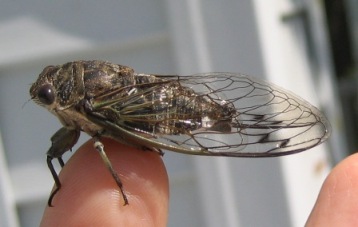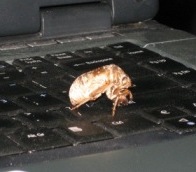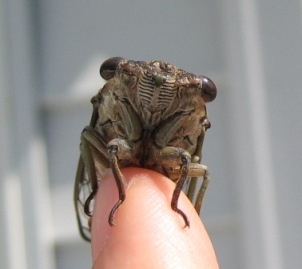 My daughter & nephew found this cicada on my parents’ pool deck this morning. It was sluggish from the cold so I was able to hold it for quite awhile to photograph it, until it got warm enough from the sun to fly off.
My daughter & nephew found this cicada on my parents’ pool deck this morning. It was sluggish from the cold so I was able to hold it for quite awhile to photograph it, until it got warm enough from the sun to fly off.
I’ve been fascinated by cicadas since I was a kid. Those wings — aren’t those amazing wings? And the huge sound they make — you can’t help but know they’re all around — yet you hardly ever see them, they hide so far up in the trees.
(Although you can easily find the husks of the nymphs. Here’s a pic of a husk my daughter found a few weeks ago — not a great pic because I took it tonight, so the flash is going off.)

As I started this post, I thought maybe I could figure out what species of cicada I’d photographed today, but no luck — it doesn’t look much like the photos I found of various species online. It also turns out there are a loooot of different kinds of cicadas — 100 species in North America alone, 2500 worldwide. About all I can figure is that it’s probably a dog day or annual cicada, not a periodic cicada.
I thought this was interesting, too:
Cicadas are unique in sound-producing insects in that they have a musical drum in their abdomen. The organs that produce sound are ‘tymbales’ ~ paired membranes that are ribbed and located at the abdominal base. Contracting the internal tymbal muscles yield a pulse of sound as the tymbals buckle inwards. As these muscles relax, the tymbals return to their original position. The interior of the male abdomen is substantially hollow to amplify the resonance of the sound. The song intensity of the louder cicadas acts as an effective bird repellent. Males of many species tend to gather which creates a greater sound intensity and engenders protection from avian predators.
In addition to the mating song, many species also have a distinct distress call, usually a somewhat broken and erratic sound emitted when an individual is seized.
One summer –it must have been in the 70s — while we were visiting my paternal grandparents in Germantown, New York, I happened to be out in the yard when I heard a racket in the air — a cicada killer wasp had attacked a cicada; they were grappling midair like two monsters in a Godzilla movie, the cicada buzzing noisily — the sound was recognizable as a cicada buzz but at the same time it didn’t sound at all like when they call from the trees. “Broken and erratic” for sure.
I guessed what was going on — I’d probably read about cicada wasps in Ranger Rick or someplace.
It’s one of the pleasures of summer vacation for a kid though, isn’t it? To spend all that time hanging around “not doing anything,” and as a consequence catching things like that — like a cicada wasp seizing a cicada. It’s not even that such things are so uncommon, either, just that you have to be in the proverbial right place/right time.
Anyway. A few more weeks of cicadas singing yet, before the summer’s done. Happy dog days. Good night.


“It was sluggish from the cold . . .”
WHAT cold?
Oh; that’s right. You live in the arctic regions where it gets below 78 degrees at night in August. We had 101 degrees here today with a hades index of about a 0.96 (a ratio measure of the current ourtside temperature compared to the current reading in hades). Meaning, in layman’s terms, it was “danged near hot as hell here today!”
John
I was visiting my parents, John, and you can’t believe how chilly it gets overnight in their neck of the woods, owing to the high elevation. Here in Rochester it’s not quite so bad . . .
That mid-air strife must have been incredible to behold! It reminded me that I once heard a somewhat pitiful cicada sound: lower-pitched and a bit broken; I looked up to see a cicada, still trying to “sing”, in the beak of a flying bird.
Fantastic!
I so treasure catching events like that . . .
Like migrating geese in autumn, cicadas are the sound of summer to me.